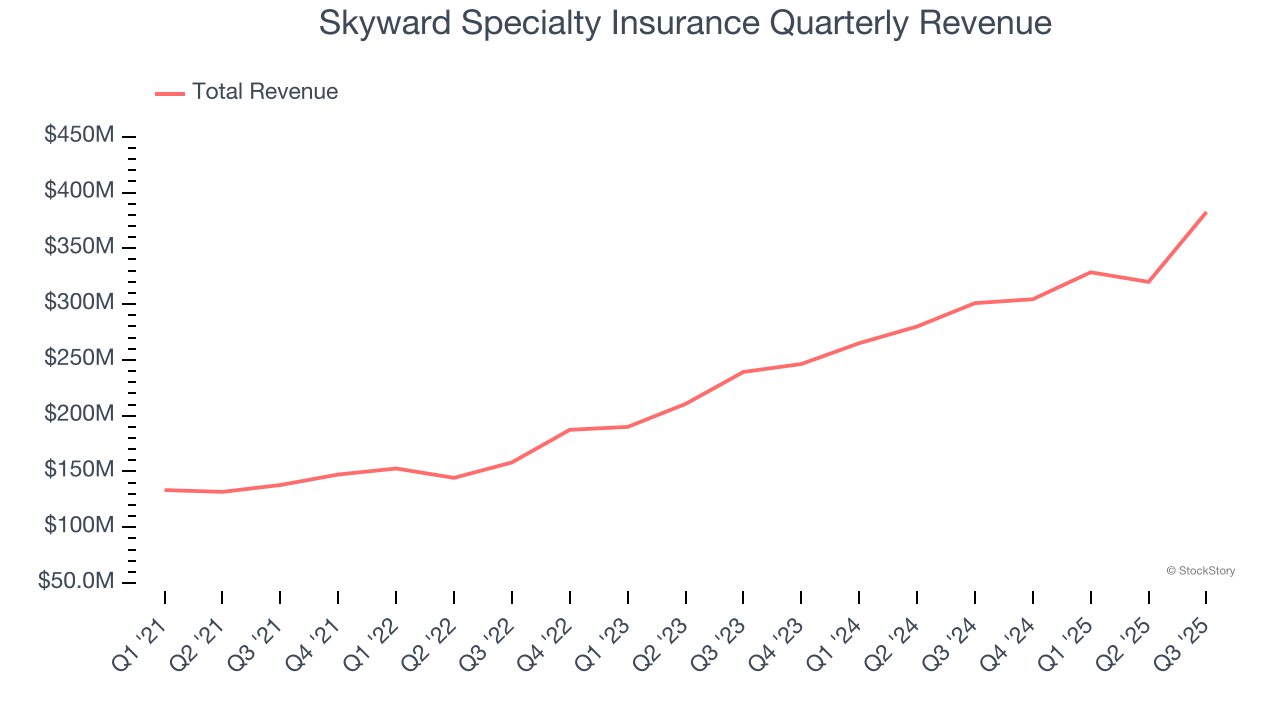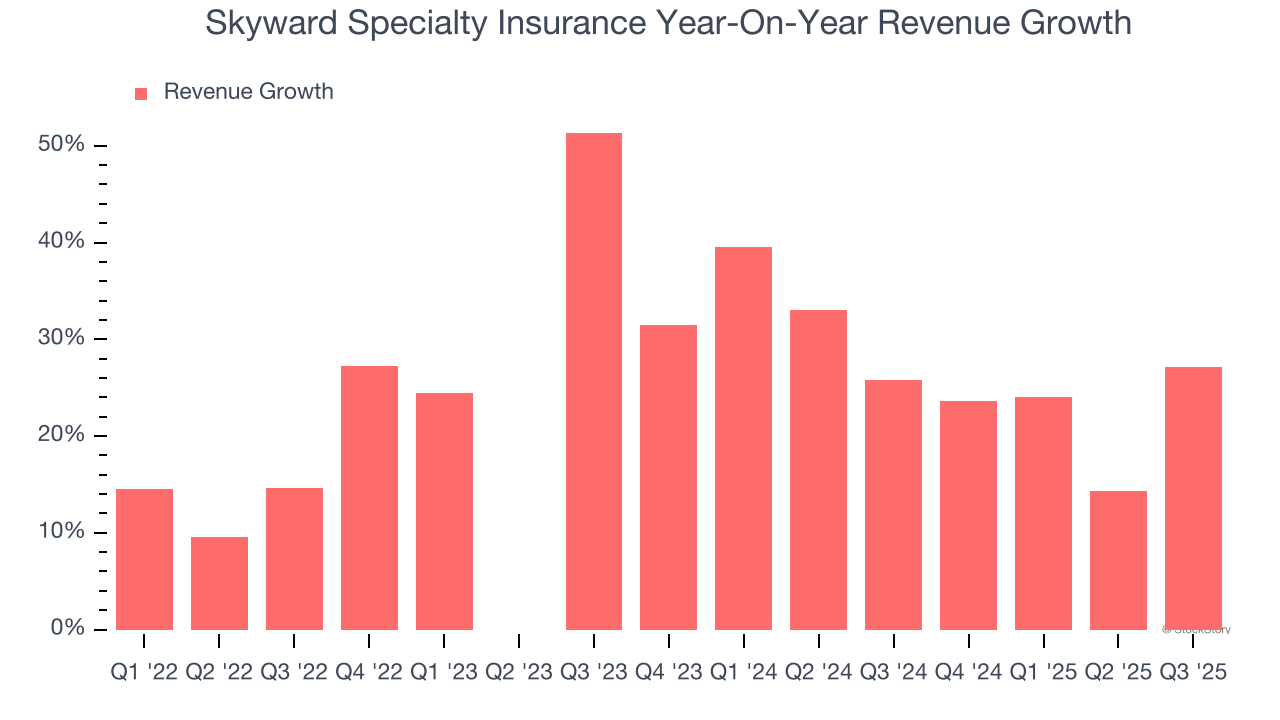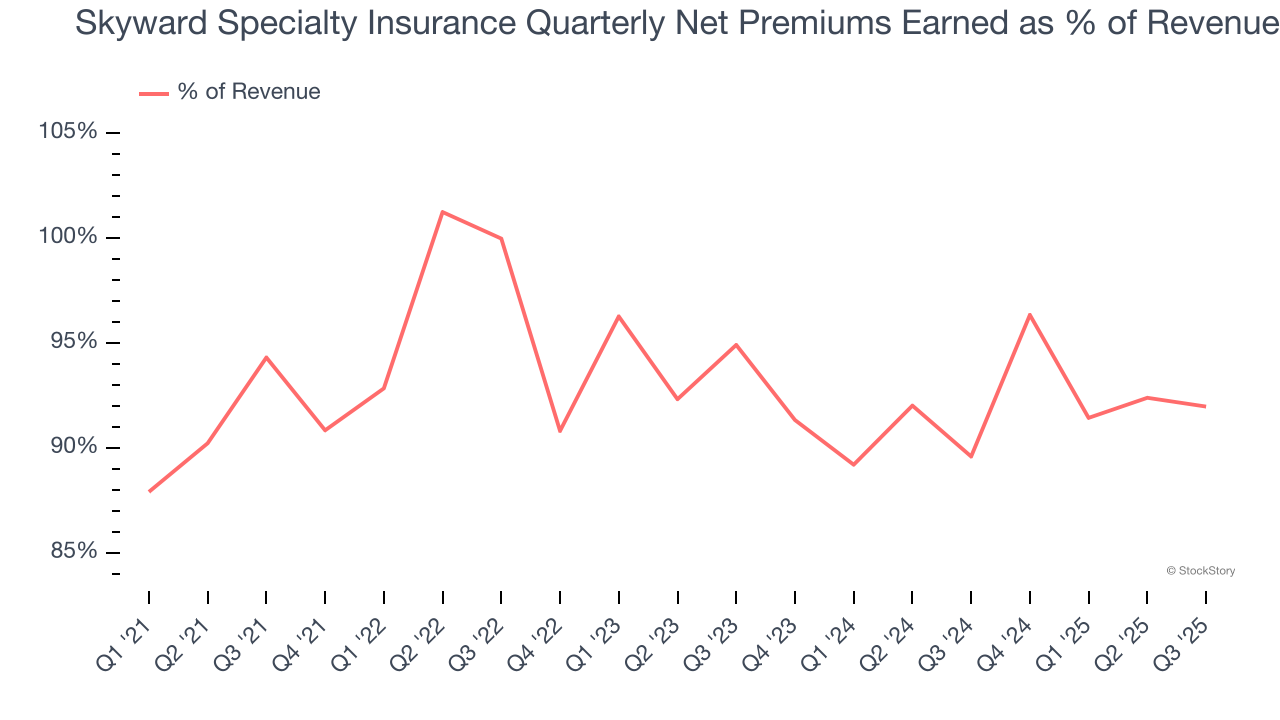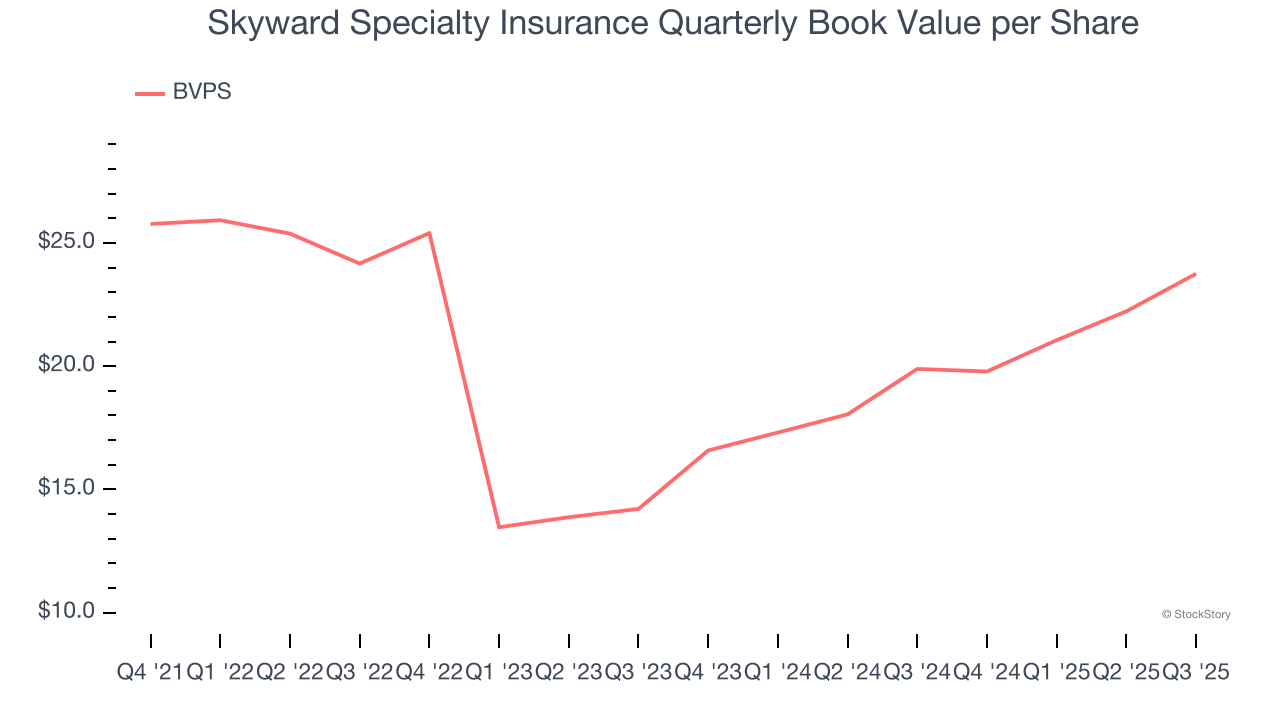
Specialty insurance provider Skyward Specialty Insurance (NASDAQ: SKWD) reported Q3 CY2025 results exceeding the market’s revenue expectations, with sales up 27.1% year on year to $382.5 million. Its non-GAAP profit of $1.05 per share was 18.6% above analysts’ consensus estimates.
Is now the time to buy Skyward Specialty Insurance? Find out by accessing our full research report, it’s free for active Edge members.
Skyward Specialty Insurance (SKWD) Q3 CY2025 Highlights:
- Net Premiums Earned: $351.8 million vs analyst estimates of $310.1 million (30.5% year-on-year growth, 13.5% beat)
- Revenue: $382.5 million vs analyst estimates of $334.8 million (27.1% year-on-year growth, 14.3% beat)
- Combined Ratio: 89.2% vs analyst estimates of 90.9% (174.4 basis point beat)
- Adjusted EPS: $1.05 vs analyst estimates of $0.89 (18.6% beat)
- Book Value per Share: $23.75 vs analyst estimates of $22.72 (19.4% year-on-year growth, 4.6% beat)
- Market Capitalization: $1.83 billion
Skyward Specialty Chairman and CEO Andrew Robinson commented, “Our third quarter results were exceptional, extending our track record of profitable growth and double-digit returns. Gross written premiums grew more than 50%, we achieved a Company-best combined ratio of 89.2% and annualized return on equity of 19.3%. Five of our nine divisions grew by more than 25% in the quarter, led by the agriculture and credit (re)insurance division. These results underscore the strength and discipline of our “Rule Our Niche” strategy and the benefits of our intentionally diversified portfolio, much of which is less exposed to P&C market cycles.
Company Overview
Founded in 2006 to serve markets where standard insurance coverage falls short, Skyward Specialty Insurance (NASDAQ: SKWD) provides customized commercial property, casualty, and health insurance solutions for underserved or specialized market niches.
Revenue Growth
Insurers earn revenue three ways. The core insurance business itself, often called underwriting and represented in the income statement as premiums earned, is one way. Investment income from investing the “float” (premiums collected upfront not yet paid out as claims) in assets such as fixed-income assets and equities is the second way. Fees from various sources such as policy administration, annuities, or other value-added services is the third. Luckily, Skyward Specialty Insurance’s revenue grew at an incredible 26.5% compounded annual growth rate over the last four years. Its growth surpassed the average insurance company and shows its offerings resonate with customers, a great starting point for our analysis.

Long-term growth is the most important, but within financials, a stretched historical view may miss recent interest rate changes and market returns. Skyward Specialty Insurance’s annualized revenue growth of 27.1% over the last two years aligns with its four-year trend, suggesting its demand was predictably strong.  Note: Quarters not shown were determined to be outliers, impacted by outsized investment gains/losses that are not indicative of the recurring fundamentals of the business.
Note: Quarters not shown were determined to be outliers, impacted by outsized investment gains/losses that are not indicative of the recurring fundamentals of the business.
This quarter, Skyward Specialty Insurance reported robust year-on-year revenue growth of 27.1%, and its $382.5 million of revenue topped Wall Street estimates by 14.3%.
Net premiums earned made up 92.7% of the company’s total revenue during the last five years, meaning Skyward Specialty Insurance lives and dies by its underwriting activities because non-insurance operations barely move the needle.

Our experience and research show the market cares primarily about an insurer’s net premiums earned growth as investment and fee income are considered more susceptible to market volatility and economic cycles.
Here at StockStory, we certainly understand the potential of thematic investing. Diverse winners from Microsoft (MSFT) to Alphabet (GOOG), Coca-Cola (KO) to Monster Beverage (MNST) could all have been identified as promising growth stories with a megatrend driving the growth. So, in that spirit, we’ve identified a relatively under-the-radar profitable growth stock benefiting from the rise of AI, available to you FREE via this link.
Book Value Per Share (BVPS)
Insurance companies are balance sheet businesses, collecting premiums upfront and paying out claims over time. The float – premiums collected but not yet paid out – are invested, creating an asset base supported by a liability structure. Book value captures this dynamic by measuring:
- Assets (investment portfolio, cash, reinsurance recoverables) - liabilities (claim reserves, debt, future policy benefits)
BVPS is essentially the residual value for shareholders.
We therefore consider BVPS very important to track for insurers and a metric that sheds light on business quality because it reflects long-term capital growth and is harder to manipulate than more commonly-used metrics like EPS.
Fortunately for investors, Skyward Specialty Insurance’s BVPS grew at an incredible 29.3% annual clip over the last two years.

Over the next 12 months, Consensus estimates call for Skyward Specialty Insurance’s BVPS to grow by 22% to $22.72, elite growth rate.
Key Takeaways from Skyward Specialty Insurance’s Q3 Results
We were impressed by how significantly Skyward Specialty Insurance blew past analysts’ net premiums earned expectations this quarter. We were also excited its revenue outperformed Wall Street’s estimates by a wide margin. Zooming out, we think this was a solid print. The stock traded up 4.2% to $46.85 immediately after reporting.
Skyward Specialty Insurance may have had a good quarter, but does that mean you should invest right now? We think that the latest quarter is only one piece of the longer-term business quality puzzle. Quality, when combined with valuation, can help determine if the stock is a buy. We cover that in our actionable full research report which you can read here, it’s free for active Edge members.




